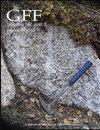Zircon U–Pb-Hf isotope data in eclogite and metagabbro from southern Sweden reveal a common long-lived evolution and enriched source
IF 1.2
4区 地球科学
Q2 GEOLOGY
引用次数: 1
Abstract
ABSTRACT Several orogenies have shaped the bedrock of southern Sweden. While mafic intrusions represent significant sources of information for reconstructing geodynamics and crustal evolution, the characterization of the various generations of such intrusions in Sweden remains limited. We report in situ zircon U–Pb ages and Hf isotope data from a Fe-Ti eclogite and a coronitic metagabbro from the Eastern Segment in southern Sweden. Crystallisation ages at 1683 ± 17 Ma of the eclogite suggest affiliation with the surrounding 1730–1660 Ma Transscandinavian Igneous Belt intrusions that dominate the Eastern Segment. Secondary zircon growth and Pb-loss in the eclogite sample at 1459 ± 44 Ma and the crystallisation of the metagabbro at 1431 ± 26 Ma overlap and are related to magmatic activity during the Hallandian orogeny. Zircon Hf isotope signatures with chondritic and sub-chondritic values at ~1683 Ma and ~1431 Ma, respectively, correspond to an enriched (or mildly depleted) source in line with a “Mixed Svecofennian Crustal Reservoir”. These isotope signatures are more enriched than those in the surrounding gneisses. Zircon isotope data from the herein analysed zircon grains indicate that the eclogite and metagabbro had an enriched mafic source in the mid to lower crust, or within the subcontinental lithospheric mantle below Fennoscandia.瑞典南部榴辉岩和变辉长岩中的锆石U–Pb Hf同位素数据揭示了一个共同的长期演化和富集来源
几个造山运动塑造了瑞典南部的基岩。虽然基性侵入体是重建地球动力学和地壳演化的重要信息来源,但对瑞典各代此类侵入体的描述仍然有限。本文报道了来自瑞典南部东段铁钛榴辉岩和冠状变长岩的原位锆石U-Pb年龄和Hf同位素数据。榴辉岩的结晶年龄为1683±17 Ma,表明其与周围的1730-1660 Ma横越斯堪的纳维亚火成岩带岩体有关,该岩体在东段占主导地位。1459±44 Ma时榴辉岩的次生锆石生长和pb损失与1431±26 Ma时辉长岩的结晶重叠,与哈兰德造山时期的岩浆活动有关。锆石Hf同位素特征分别为~1683 Ma和~1431 Ma的球粒和亚球粒值,对应于一个富集(或轻度亏缺)的烃源岩,符合“混合斯特芬系地壳储层”。这些同位素特征比周围片麻岩的同位素特征更丰富。本文分析的锆石颗粒锆石同位素数据表明,榴辉岩和变质长岩在芬诺斯坎迪亚的中下地壳或次大陆岩石圈地幔内具有丰富的基性来源。
本文章由计算机程序翻译,如有差异,请以英文原文为准。
求助全文
约1分钟内获得全文
求助全文
来源期刊

Gff
地学-地质学
CiteScore
2.80
自引率
10.00%
发文量
11
审稿时长
>12 weeks
期刊介绍:
GFF is the journal of the Geological Society of Sweden. It is an international scientific journal that publishes papers in English covering the whole field of geology and palaeontology, i.e. petrology, mineralogy, stratigraphy, systematic palaeontology, palaeogeography, historical geology and Quaternary geology. Systematic descriptions of fossils, minerals and rocks are an important part of GFF''s publishing record. Papers on regional or local geology should deal with Balto-Scandian or Northern European geology, or with geologically related areas. Papers on geophysics, geochemistry, biogeochemistry, climatology and hydrology should have a geological context. Descriptions of new methods (analytical, instrumental or numerical), should be relevant to the broad scope of the journal. Review articles are welcome, and may be solicited occasionally. Thematic issues are also possible.
 求助内容:
求助内容: 应助结果提醒方式:
应助结果提醒方式:


